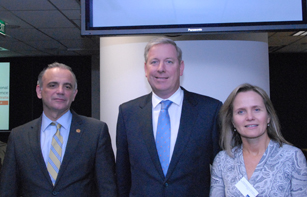
L to R: UNAIDS Deputy Executive Director of Programme, Dr Luiz Loures, Minister of Health for Victoria State the Hon. David Davis MP, and Prof Sharon R Lewin, Director, Infectious Diseases Unit, Alfred Hospital and CoChair AIDS Conference Melbourne, during the launch of the new logo for the 20th International AIDS Conference taking place in Melbourne, Australia in July 2014.
Stepping up its leadership role in the response to AIDS, Australia is the new Vice-Chair of the Programme Coordinating Board of the Joint United Nations Programme on AIDS. The country has also kicked off the countdown to the next International AIDS conference to be held in Melbourne in July 2014.
As part of the kick off to Melbourne 2014, a new logo was presented. Speaking at the presentation, the Minister of Health for Victoria State the Hon. David Davis MP said he expected AIDS 2014 to be momentous, “The conference represents a generational opportunity for our State to lead and learn from, a collaborative, global dialogue on HIV.”
The logo was designed by 22 year-old Tanzanian artist Yohana Longinus Haule, who won an international competition to create the new logo. It features two pairs of abstract footprints in the shapes of the AIDS red ribbon to represent steps forward in the challenge to HIV both for individuals dealing with the virus and for the entire global response.
As Australia prepares to host the International AIDS Conference next year, UNAIDS looks forward to a continued close collaboration as we collectively strive for results expanding access to treatment and stopping new HIV infections.
UNAIDS Deputy Executive Director of Programme Dr Luiz Loures
In hosting AIDS 2014, Australia is demonstrating its leading role in the AIDS response. The country is especially known for its research and programmes for key populations, such as men who have sex with men—who make up some two thirds of new HIV infections in a national prevalence of 0.2%.
UNAIDS Deputy Executive Director of Programme, Dr Luiz Loures, attended the presentation and praised the country’s guiding role, “As Australia prepares to host the International AIDS Conference next year, UNAIDS looks forward to a continued close collaboration as we collectively strive for results expanding access to treatment and stopping new HIV infections.”
As part of this close collaboration, Dr Loures led a senior UNAIDS delegation in a series of high-level meetings to discuss, among other issues, the successes and challenges specific to the AIDS epidemic in Asia and the Pacific. The UNAIDS delegation met with AusAID, the government’s overseas aid programme and with the Department of Health and Ageing (DoHA), the organizers of the AIDS 2014 conference and regional agencies.
The Asia-Pacific region is heavily affected by HIV with nearly 5 million people living with the virus in South, South-East and East Asia in 2011, and some 53 000 in Oceania. There has been mixed progress in key aspects of the response. Whereas most areas have seen declines in new HIV infections and AIDS-related deaths both have increased in East Asia. Across the region treatment coverage is also variable with a high of 69% in Oceania and a low of 18% in East Asia.




